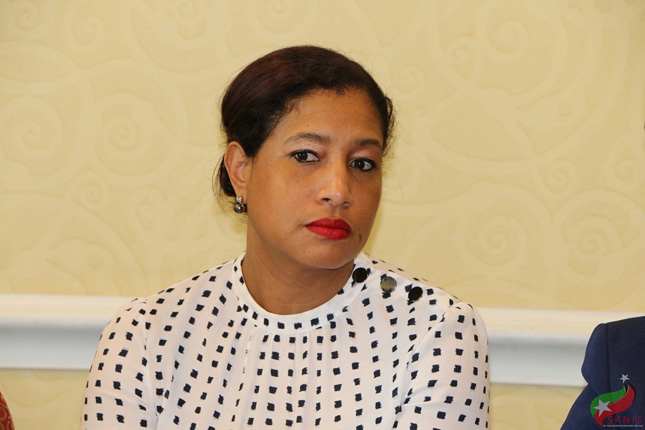St. Kitts-Nevis’ Ambassador to Belgium expresses concern over EU’s ‘unilateral’ blacklisting of Caribbean small island states
Basseterre, St. Kitts, April 11, 2019 (SKNIS): St. Kitts and Nevis’ Ambassador to Belgium (representing most of OECS in Brussels, Belgium), Her Excellency Mrs. Sharlene Shillingford- McKlmon, has expressed serious concerns about how the European Union (EU) comes up with its list of Non-cooperative Jurisdictions for Tax Purposes, which often includes vulnerable small island developing states (SIDS) within the Caribbean region.
During a press conference with the diplomatic and consular corps accredited to St. Kitts and Nevis on April 8 at the St. Kitts Marriott Resort as part of Diplomatic Week 2019 (April 7-12) under the theme “Securing a Resilient Future through Strategic Diplomacy and Effective Dialogue”, Her Excellency Shillingford-McKlmon referred to the EU’s process as “unilateral”.
“The challenges we have with the EU blacklisting process is that we consider it to be a unilateral process, a unilateral process taking place in two institutions where we don’t have any representation and where we don’t have a voice—one at the EU, and the second at the OECD (Organization for Economic Cooperation and Development),” she said.
H.E. Shillingford-McKlmon further stated: “The second challenge we have is that the EU criteria goes beyond what has been internationally accepted by countries in the world, as well as the OECD as being the criteria to meet.”
Her Excellency also stated that, “What we are facing is a global shift and a policy direction that do not take into account our vulnerabilities and our smallness and the long-term reputational damage. There is a war of sorts happening globally with respect to anti-money laundering and financial services and we’re on that list that the EU is using to send a message.”
For example, the EU blacklisted the Commonwealth of Dominica, a small island in the OECS (Organization of Eastern Caribbean States) that is still reeling from the onslaught of Hurricane Maria, a category 5 storm that decimated the island leaving loss of life and millions of dollars in damages.
“In the case of Dominica that was recently blacklisted, it was blacklisted for failing to join in an OECD convention that the OECD has not even made mandatory, but that the EU said you need to join this, and of course [Dominica] is in the process of joining but it is not finished—and well the deadline came and went, and so it was blacklisted,” Ambassador Shillingford-McKlmon said.
“And so, we have cases where countries are blacklisted not materially and substantially for being non-compliant but for reasons of process, and we do have a problem with that,” Her Excellency said.
She said that a huge part of the problem is “The unilateral nature of the review process and the fact that the criteria is moving, is changing, and what the EU is doing differs from what the OECD is doing and what is internationally recognized.”
His Excellency Dr. David Doyle, Ambassador to UNESCO, corroborated Her Excellency’s argument by stating that the movement “is increasingly coming from left and right wing populist groups in Europe…who are not big fans of financial services, big industries, multinational industries or financial tax havens.”
However, the St. Kitts and Nevis Ambassador to Belgium said that diplomacy is being vigorously employed to address this untenable situation.
“What we’re doing to assist St. Kitts and Nevis and all the countries in the Eastern Caribbean that are part of this process is that we lobby, reach out to the European Parliament, we speak to the European Commission, TAXUD—The EU directorate that governs and deals with tax issues, and we dialogue, and we try to make sure that our countries that we represent in Brussels including St. Kitts and Nevis follow a proper process to transfer information to the EU on time and to transfer the information that is requested while at the same time ensuring that we still secure a future for our countries in financial services,” Ambassador Shillingford McKlmon said.
According to Her Excellency “The EU process for creating a single list started in 2016 and the entire purpose of the EU process was to create a single listing so that we would not find ourselves on multiple lists of the 28 European countries for being considered as Non-Cooperative Jurisdictions for Tax Purposes.”

